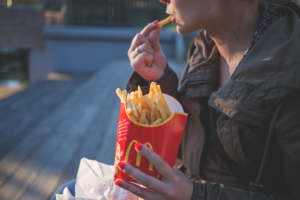The Snack Attacks Strike, Again!
 Snacks have become a huge part of our eating pattern. In fact, research suggests that 90% of Americans have at least one snack each day and 50% of our food consumption comes from snacks! Some of these snacks are intentional and others not so much.
Snacks have become a huge part of our eating pattern. In fact, research suggests that 90% of Americans have at least one snack each day and 50% of our food consumption comes from snacks! Some of these snacks are intentional and others not so much.
Do you find yourself eating when you aren’t really hungry? Have you ever begun eating something but didn’t even realize what you were doing until you moments later?
Guilt creeps in. Convicted, we often hear this familiar scripture circling through our mind,
No temptation has overtaken you except what is common to mankind. And God is faithful; he will not let you be tempted beyond what you can bear. But when you are tempted, he will also provide a way out so that you can endure it. 1 Corinthians 10:13 (NIV)
Many claim, ‘I just need more self-discipline.’ But eating isn’t wrong. Enjoying a cookie, whether at 1pm or 11pm isn’t a sin.
But we also know that the cookie isn’t a smart choice most of the time.
I’m Nibbling Because…
So why are we drawn to eat, even when we are not hungry? And more specifically, why do we long for foods that aren’t healthful?
Many brands and companies employ brilliant scientists to uncover exactly how to produce a product that tantalizes our taste buds. And, they hire a clever marketing team to capture our attention. But, unplanned snacking isn’t just about tasty food – there is a lot more involved in why we do what we do.
I think Paul speaks for all of us, at some time or another,
I do not understand what I do. For what I want to do I do not do, but what I hate I do. Romans 7:15 (NIV)
Can you relate? Maybe you feel like that a lot!
If you can, you are not bad. If you are frequently asking Holy Spirit for more self-control, be encouraged – it comes by being Spirit-led. That’s exactly what God wants us to do – realize our own weakness and reach out, acknowledging our struggles and proclaiming His strength.
The ‘Why’ Behind Nibbling

But it is also important to realize that your temptation to nibble between meals isn’t just because a food tastes good. Sometimes we are eating and not even tasting what we are eating anyway.
Here are 5 reasons why you are tempted to nibble between meals and practical strategies to help you choose differently next time.
1. The Previous Meal Did Not Physically Satisfy You
Sometimes, you can’t get food off the brain because your body really needs MORE nourishment. It is very important that you are eating enough calories, fat, protein and fiber at every single meal (even breakfast!) so that you can last at least 3 to 5 hours without feeling remotely hungry. If you are physically hungry before then, the meal was not the best choice for your body. Even if you are trying to shave off a few calories here and there, it is still critical to be eating meals that include these components.
Protein, often prized and praised, is critical for satiety, burning fat, bone health, hormone balance, repairing muscle after a workout and so much more. Do you eat the minimum 20-30 grams of protein per meal as research suggests? Keep nibbling out of your mind by including adequate protein.
The average American consumes 15 grams of fiber per day, half of the recommendation. That means you should be aiming closer to 10 grams of fiber from whole foods, per meal. Half a plate of veggies is a great place to start. But also beans, whole grains, nuts, and seeds are excellent options too.
Fat makes you feel full. Avocado, nuts, seeds, nut butters, salmon and sardines, olive oil, and avocado oil are rich sources of healthy fats to fill you up and promote good health. Remember, it is not just fat that you want but good sources of fat so that it promotes heart health, cell health, and brain function.
A few flavorful meals that will satisfy you in more ways than one:
Quinoa Edamame Salad with Citrus Vinaigrette
BBQ Chicken & Black Bean Lettuce Wraps
2. You are Feeling Deprived
Many trendy diets call you to eliminate foods and food groups in order to obtain a ‘lean and healthy body.’ While they may jumpstart weight loss or fat loss, consider whether it is really a good long-term strategy for you and your body.
People that jump on and off these diets often report that they were required to eliminate or severely restrict a food or food group and they were not mentally okay with this, even though they wanted to be.
As a side note, any eating plan that requires you to give up whole foods, needs to be reconsidered.
When we are feeling deprived, those foods which are supposedly not an option linger in our thoughts. It is easy to build them up in our heads, wanting them more and more, until finally one day, we cave. Sometimes we even justify the decision claiming, “I never eat that so it’s okay this time.”
This process cycles again and again. Restrict, restrict, restrict, … cave.
Do you want to live life in the balance of deprivation, guilt and justifying behaviors?
3. Emotional Response
 It is common to hear people talking about eating when they are stressed or anxious. But do you eat when you are feeling happy? Do you eat when you are celebrating? Do you eat when you are feeling resentful?
It is common to hear people talking about eating when they are stressed or anxious. But do you eat when you are feeling happy? Do you eat when you are celebrating? Do you eat when you are feeling resentful?
Ah-ha moments can come at any time and mine came 6-9 months ago when I realized I was eating after dinner because I resented parts of motherhood. I was frustrated and angry that I rarely got to sit down and enjoy a meal in peace and quiet. After my kids were in bed was the only time when I got to enjoy a meal without the distraction of kids. But most nights, I wasn’t really hungry. Resentment fueled this. I wasn’t walking around all day like a boiler ready to blow. It was deep-seated anger covered up with life, responsibilities, work, and everyday activities that was slowly and tenderly uncovered by Holy Spirit.
Once you identify an emotion compelling you to eat, it doesn’t automatically go away. Identification is good, but it’s only the first part. Then you get to talk to God about it, a lot, and maybe a professional too, as you create a strategy that will help you take a different action when those feelings are ignited.
4. Lack of Clear, Healthful Boundaries
While we may turn to this as the first option to consider, there is often an underlying reason for our nibbling. However, setting up some clear boundaries with food is necessary for all individuals.
Here are a few ideas:
- Close the kitchen at a specific time at night and in between meals. This reminds you and family members that it is not a snacking time until the kitchen is open for the next (planned) meal.
- Keep treats out of the house. Decide in advance when you will have a treat. Then, enjoy it when you do.
- Eat with other people. If you find that you hide or sneak food, this is a great way to enjoy community around meals and hold yourself accountable. This is also important for treat foods too.
- Drink 12-20 ounces of water between meals. Make sure that when you are hungry, it is physical hunger and not thirst making you feel empty. Plan to finish the water before you allow yourself to eat the next meal.
5. Visual Cues Trigger You
If a co-worker is snacking on a few pieces of candy during a work meeting does that trigger you? When you walk into a movie theater are you compelled to eat some popcorn? It is important to know what scenarios ‘trigger’ you and which ones don’t seem to bother you. Then, decide in advance how you will respond in those moments.
For example, if someone is snacking on chips or pretzels at the party, it doesn’t bother me. I am able to move past it without an issue. But if there is a piece of homemade carrot cake sitting on a dessert table, it requires a lot more restraint- and a plan.
Which reason do you identify with most? Why? Take one minute- just one- to think and pray about this.
So, what’s the play call?
Good health is at the intersection of smart physical boundaries, emotional health, and spirit living.
If you are frustrated with your nibbling behaviors, don’t put your faith solely in a diet or eating plan. There are benefits to an intentional eating plan and physical wellness results from how you care for your body. But, go deeper. Decide to discover the “why” behind the “what”. Partner with God. This is how you can begin…
Father-
Teach me 1 physical boundary I need to set for myself.
Reveal 1 reason I eat when I am not hungry.
Help me hear you even among the distractions and noise around me.
No matter what foods are before me, help me want you more.
Dear friend, I pray that you may enjoy good health and that all may go well with you, even as your soul is getting along well. 3 John 1:2




